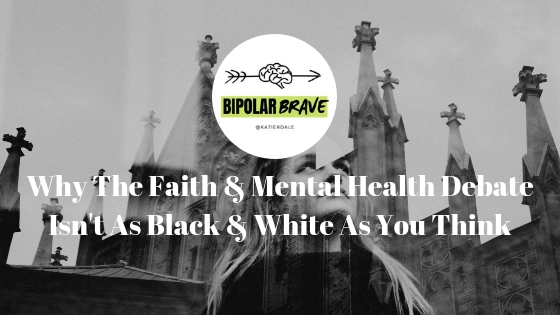At one point I believed I just needed more faith for God to heal me of my bipolar disorder.
Blanket statements sound good on the surface but are notorious for glossing over the smaller truths of the matter. I would like to point out that after stepping off the ledge of reason into an abyss with blind faith, I still came out more sound of mind than before. So, did God in fact heal me of my symptoms and side effects of the medicine when I turned to Him, and through the gift of medicine grant me the desires of my heart? I wonder sometimes: if God did this for me, why doesn’t He do this for others? Do we really need to conjure more faith in the Lord, to see more of His glory?
It’s been quoted many times by many well-meaning Christians that prayer and faith will move mountains. We can’t discredit this, heck, it’s straight from Jesus in the Bible (Matthew 17:20). So are those quoting Jesus misled or misinterpreting this? I really don’t think it’s as clear or black and white as we project.
I’m no theologian or Bible scholar, but I know what my experience in life has been. Who am I to say that faith won’t move mountains? Especially considering my own battle of defying disbelief.
Before I went off my medications in 2012, for the majority of the eight years I spent consulting with my doctors and tweaking my medications, I hoped and prayed and believed for healing. I claimed it in Jesus’ name, by His blood, and thanked Him in advance for it. In hindsight, I know now that it was a mistake to go off my medications to find healing. However, through returning to a very similar concoction of medications as what I took prior to abandoning them, I found the exact dosage and kinds of psych meds I needed.
Today, my moods are stabilized and any side effects of the medications are non-existent.
Let me be clear: there is no “magic pill.” It also took work on my part to relieve depression and fanciful thinking through therapy. But meds and therapy alone didn’t get me to where I am today! I say this, cautious to claim that I’ve been healed. I’ve been given the gift of medication and worked through my cognitive distortions. Have I arrived? Not even close. But I recognize that many people I work with in mental healthcare still struggle with their symptoms and medicinal side effects.
Many other Christians, full of faith and a close walk with Jesus, still struggle as well. I don’t want to discount their stories or faith in the least. But I am left to wonder why I am fortunate to have been freed from my symptoms and despite their immense faith, they’re left to deal with the battle on a daily basis. The power of prayer and having “enough faith” does not always equal God’s sovereign will.
It’s not as black and white as one may think. I still wonder why I was fortunate enough to have been blessed in this way. How can I deny my faith in the midst of the breakthrough I’ve been blessed to have, yet at the same time question so many others’ faith if they haven’t gotten the same results? I cannot logically reconcile these two contrary thoughts.
Just as Paul asked God to take the thorn from his flesh, God provided the grace sufficient for Paul to go on living with the ailment.
2 Corinthians 12:7-10 (ESV):
So to keep me from becoming conceited because of the surpassing greatness of the revelations, a thorn was given me in the flesh, a messenger of Satan to harass me, to keep me from becoming conceited. Three times I pleaded with the Lord about this, that it should leave me. But he said to me,
“My grace is sufficient for you, for my power is made perfect in weakness.”
Therefore I will boast all the more gladly of my weaknesses, so that the power of Christ may rest upon me. For the sake of Christ, then, I am content with weaknesses, insults, hardships, persecutions, and calamities. For when I am weak, then I am strong.
I’m confident God can handle each person’s battles with mood disorders. I just find it hard to say one way or another how faith impacts mental health. The debate isn’t as simple as “having enough faith.” It must be case by case, person by person, mood disorder by mood disorder. There’s no simple way of explaining behaviors or recovery from those behaviors in anyone, Christian or not. Amount of faith does not correlate with amount of sanity or how recovered someone is from a disorder. Though I believe my faith and action to find healing proved fruitful: I wanted healing, I watered the seeds that were planted, they grew a sound mind.
The bottom line is, it’s not up to us. The determining factor of our mental health and wellness when we have mental illness lies in God’s hands. This does not mean that we shouldn’t have faith that God heals, but that we should apply all the faith He grants to us in line with His will, to ask to receive what He determines is best.
What about you? Do you think faith determines the mountains we move?
When have you asked God to move a mountain and believed He would and He did?

What do you think?